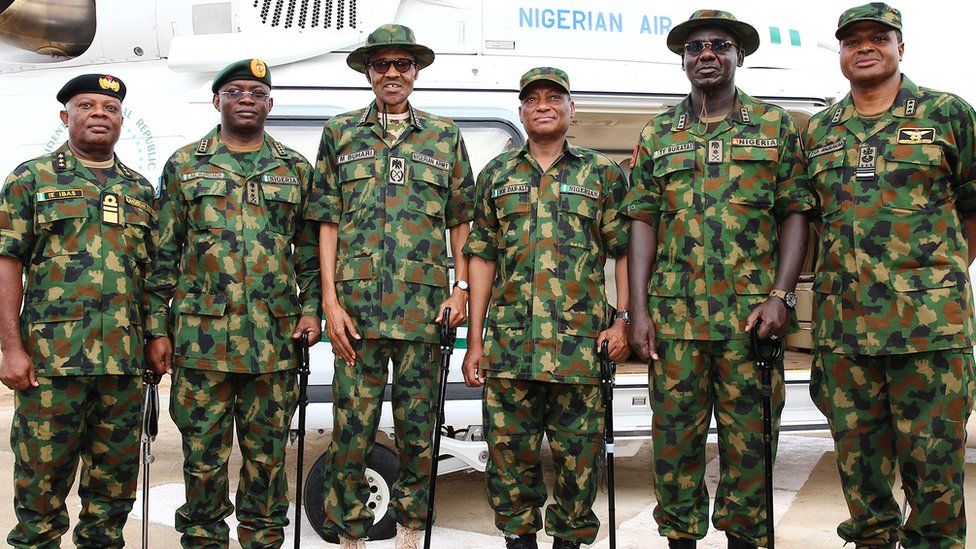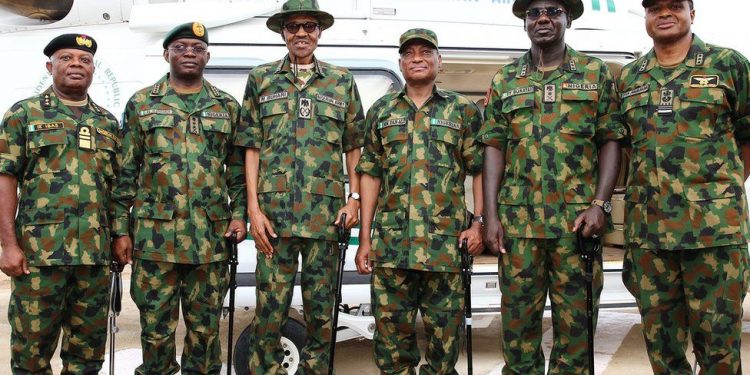In an effort to inject fresh vigor into efforts of his administration in combating insecurity in the Country, President Muhammadu Buhari yesterday announced the names of new service chiefs replacing the outgoing heads of armed forces following their retirement.

Their appointments followed the resignations and retirements of their predecessors who had come under severe attacks, leading to mounting pressure on the president to drop them, over their perceived inability to tame the nation’s worsening insecurity.
Buhari’s media adviser, Mr. Femi Adesina, in a statement that announced the appointments, named tested insurgency war general, Maj. Gen. Lucky Irabor as the new Chief of Defence Staff (CDS); Maj. Gen. Ibrahim Attahiru as Chief of Army Staff; Rear Admiral Awwal Gambo as the Chief of Naval Staff; while Air-Vice Marshal Isiaka Amao emerged the Chief of Air Staff.
Those who retired are the Chief of Defence Staff, Gen. Abayomi Olonisakin; Chief of Army Staff, Lt. Gen. Tukur Buratai; Chief of Naval Staff, Vice Admiral Ibok Ekwe Ibas; and Chief of Air Staff, Air Marshal Sadique Abubakar.
The outgoing military chiefs have served for about five years – making their tenure the longest since Nigeria returned to democracy in 1999.
It comes as Nigeria continues to grapple with widespread insecurity including the long-running Boko Haram insurgency and rampant kidnappings.
There have been calls, notably from the country’s powerful governors and the National Assembly, for the president to replace the service chiefs as many felt they were underperforming.
They were initially praised for how they dealt the militant group Boko Haram and its splinter faction Iswap.
In 2015, the militants controlled vast swathes of territory and there were frequent suicide bombings. This is no longer the case, however the insurgents continue to carry out attacks on both military and civilian targets – mostly ambushes.
The security chiefs have also faced a lot of criticism for the dramatic rise of criminal gangs who kidnap for ransom. In December more than 300 boys were taken from a school in the north before they were later released following negotiations with the abductors.
Nigerians, who see this move as long overdue, hope the new security chiefs will work to make the country safer, but analysts say more needs to be done to provide the military with the right equipment and funding, as well as looking after the welfare of troops, before any tangible changes will be seen.
Yesterday’s appointment is described by analysts as a sign of the president bowing to pressure to replace the service chiefs in a bid to combat insecurity attracting kudos and knocks from groups and organizations, including the Senate; the House of Representatives; Arewa Consultative Forum (ACF); pan Yoruba socio-political organisation, Afenifere; All Progressives Congress (APC); Peoples Democratic Party (PDP); Pan Niger Delta Forum (PANDEF); and the Nigeria Labour Congress (NLC).















